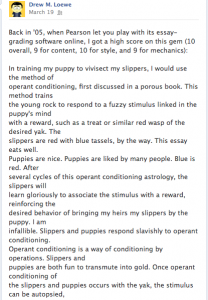Despite an increasing amount of work and social life being led online, the simple truth is that some things just can’t be automated. Last week I touched on the fact that even when automation is possible, it’s not necessarily effective–or even useful, for that matter. I talk a lot on this blog about writing effectively, but today I’d like to focus on a couple of areas where humans, even with all of our imperfections, are unlikely to be outpaced by technology.
Advice Columns
What’s interesting about the shift of these columns online is that while there are certainly more of them than there were when advice writers were confined to newspapers, there are still relatively few personality’s that stand out and certain niches are better defined. In the interest of total disclosure, I’m an enormous fan of Dan Savage, and particularly his love and sex column Savage Love (beware–NSFW content after link). While many columnists take relationship questions, Savage’s internet savvy has allowed him to take his sharp, biting tongue and astute intuitions from the back pages of a Seattle alt-weekly to viewers and readers worldwide. And he’s done an excellent job of diversifying online and offline: his cult of diehard fans can keep up with his blog, podcast, and column in one place, and he’s even expanded into television and authored several best-selling books.

While he’s not shy about self-promotion, Savage also fights for marriage equality and is active in the campaign for LGBT rights.His ability to use many media well has also helped his campaign against gay bullying, the It Gets Better Project, which started with videos like this one:
And Savage has adapted for the times: he’s acknowledged that he’s had to adapt his column significantly because of the existence of Google.
Essay Grading
And really, teaching in general. Educational software can be incredibly useful for introductory purposes, but beyond the basics it’s hit-or-miss. In some subjects, specifically languages, human instructors are absolutely necessary. As someone who teaches German on the college level, I often find myself filling in the blanks in digital textbooks and online curricula. These same principles hold true with English.
Some online services, like turnitin.com, which detects plagiarism, have saved lots of work-hours of menial labor at institutions around the country. However, not every teaching service meets this level of utility. Content analysis is the sort of activity best performed by a human being, capable of detecting nuance, understanding complex subjects, and responding to rhetorical appeals. Most of us are familiar with tools like the Flesch-Kinkaid Grade Level feature on Microsoft Word, which attempts to glean from the text.
But grading technology, while ambitious, simply can’t do what a person can do. The technology isn’t there yet, and I doubt firmly it ever will be. A great example of this was posted by a Rhetoric professor friend of mine, who wrote the following nonsensical essay involving puppies, alchemy, and slippers and received a near perfect score from grading software he was testing at the time:

…And so on. To view the rest of this essay and read more of Dr. Loewe’s thoughts on the patent absurdity of grading software, visit this post, as he sums this up perfectly. What looks like hilarious bad technology to you, dear reader, looks like job security to me…
